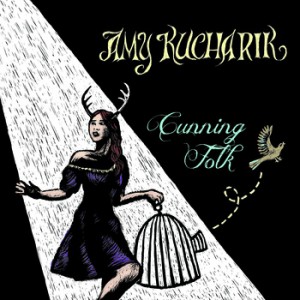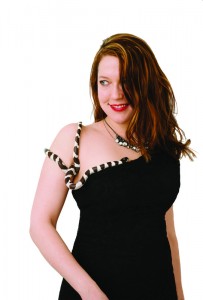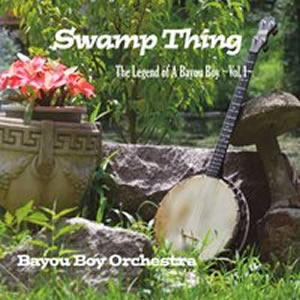 Amy Kucharik’s debut full length CD Cunning Folk is delightful beyond what the word delightful could ever define. Listening to Cunning Folk makes one feel he’s just woken up inside the world of Jay Gatsby in the swinging 1920s. Kucharik has mastered the idioms and nuances of early American music so well that she completely immerses her listener in a lovelier, simpler time in history.
Amy Kucharik’s debut full length CD Cunning Folk is delightful beyond what the word delightful could ever define. Listening to Cunning Folk makes one feel he’s just woken up inside the world of Jay Gatsby in the swinging 1920s. Kucharik has mastered the idioms and nuances of early American music so well that she completely immerses her listener in a lovelier, simpler time in history.
Opening cut “Prodigal Son” sashays in with a sweet harmonica melody line blowing in the backdrop while Kucharik works her magic. She has a high, sweet, girlish vocal timbre that fills her song with character and personality. Behind her timbre is a more forceful personality that slowly sounds gutsier and gutsier as she moves forward. A weave of instrumentation makes this one feel like a traveling party, especially an upright bass that packs plenty of plucky power in its groove.
“Like A Boss” is a witty examination of office language and practices that Kucharik has a lot of fun with. While she’s obviously talking about something more sensual, her delivery, part innocent, part knowing, keeps us from taking the whole thing too seriously. Kucharik knows how to weave a perfect musical texture for her songs. Here, a sassy horn line marvelously drawls out the tension of this song. Meanwhile, two melody instruments chirp prettily while a low end instrument gives it swing. One loses oneself in that weave of instrumentation while Kucharik tops it off with her “sweet little me” vocal delivery.
“He Doesn’t Need To Know” has a defiant edge in its acoustic guitar melody, a melody that leads this number with a fine persistent edge. Kucharik applies her sweet pretty voice so well to the attitude-laden guitar line that one would think she was born singing this song. Boasting of her infidelity, the female character in this song gets to revel in her daring attitude. Kucharik quaintly serves up the sass, making this ode to two timing stands up like an anthem to personal freedom as much as it sounds like a devilish wink to risqué behavior.
 Kucharik has a fascination with a certain reptile which she pays homage to in “The Cunning Snake,” a brief instrumental ode that oozes out of the stereo speakers with a sly horn melody. Segue into “Buzzard’s Bay,” another old timey style number, one which makes a listener want to jitterbug to the drummer’s tom tom rhythmic pulse. A clarinet makes a shiny, handsome appearance, dipping and weaving through the bouncy percussion sounds. When it kicks into overdrive, it’s impossible not to picture a swinging, 1920s dancehall with flappers bopping to the abundance of groove and melodic kick in the room. Kucharik accompanies all of this with a dainty voice that finds the perfect place in the midst of fine instrumentation. She chirps brightly with her girlish voice and navigates well all of the twists and turns here.
Kucharik has a fascination with a certain reptile which she pays homage to in “The Cunning Snake,” a brief instrumental ode that oozes out of the stereo speakers with a sly horn melody. Segue into “Buzzard’s Bay,” another old timey style number, one which makes a listener want to jitterbug to the drummer’s tom tom rhythmic pulse. A clarinet makes a shiny, handsome appearance, dipping and weaving through the bouncy percussion sounds. When it kicks into overdrive, it’s impossible not to picture a swinging, 1920s dancehall with flappers bopping to the abundance of groove and melodic kick in the room. Kucharik accompanies all of this with a dainty voice that finds the perfect place in the midst of fine instrumentation. She chirps brightly with her girlish voice and navigates well all of the twists and turns here.
“Stranger” finds Kucharik singing in a low key manner to a quiet harmonica line and acoustic guitar melody. She uses this easeful mood to show what she can do with vocal nuances. Her voice is rich with character, sustaining beautifully, gliding smoothly alongside a melancholy cello. This sleepy, weepy number feels like the heart of a woman crying out to us from an earlier time. It’s a sad but beautiful expression of becoming alienated from a lover.
Kucharik sexys things up when she makes a leap through time into the 1970s with her funkier, more modern sounding “Strike-Anywhere Match,” electric guitar riffs and R&B horns giving greater edge. With Kucharik’s sensual vocal application and a hefty dose of sass, this song’s personality lives up to its title. Like something with the potential to ignite at any moment, Kucharik keeps the tension simmering just below the surface with her carefully measured vocal delivery, giving this song a bold expression.
“The Snake” crawls in with melancholy aplomb on a mournful violin and cello line. Soon, things feel even heavier when an upright bass plucks some of its darker, chunkier notes. An acoustic guitar melody haunts the listener’s mind with its tender, mournful picking style. Kucharik then lives up to the expectations set by this intro. She, in a seemingly carefree manner, lets her voice pour its sweetness all over her dark lyrics, letting them belie the sociopath character who narrates this number. Her voice becomes lush with feeling and, alongside a mesh of accompaniment, swells with significant expression.
 Kucharik’s locally popular ditty “The Noncommittal Love Song” has lyrical fun detailing a woman who doesn’t want to settle down as much as she likes to keep a partner around for kicks. Kucharik’s modern day lyrical theme fits in well with the old time arrangement of upright bass, jazzy piano bar notes, and sugary horn lines. Her voice takes its time dancing through the light touches of instrumentation to give this whole thing an intriguing, bouncy lilt.
Kucharik’s locally popular ditty “The Noncommittal Love Song” has lyrical fun detailing a woman who doesn’t want to settle down as much as she likes to keep a partner around for kicks. Kucharik’s modern day lyrical theme fits in well with the old time arrangement of upright bass, jazzy piano bar notes, and sugary horn lines. Her voice takes its time dancing through the light touches of instrumentation to give this whole thing an intriguing, bouncy lilt.
Kucharik closes out her album with the swinging “Clocks And Bottles.” This one bops its way forward with a bounce in its step. Kucharik, all class moving through assertive piano and persistent horn lines, knows her early 20th century genres well, and she milks this arrangement and its instrumentation for all its worth.
Kucharik has done well for herself with this debut full length CD, Cunning Folk. There are more pretty melodies here than one can shake a stick at, and Kucharik easefully combines her pretty timbre with a mesh of fine players. For those who have a love of acoustic instruments and early 20th century music, Kucharik’s Cunning Folk is a must have.

